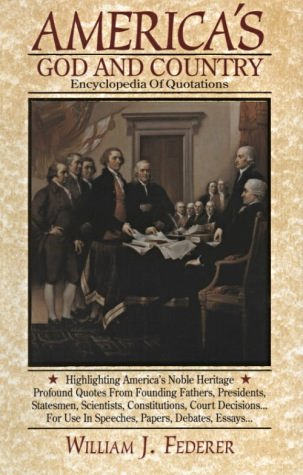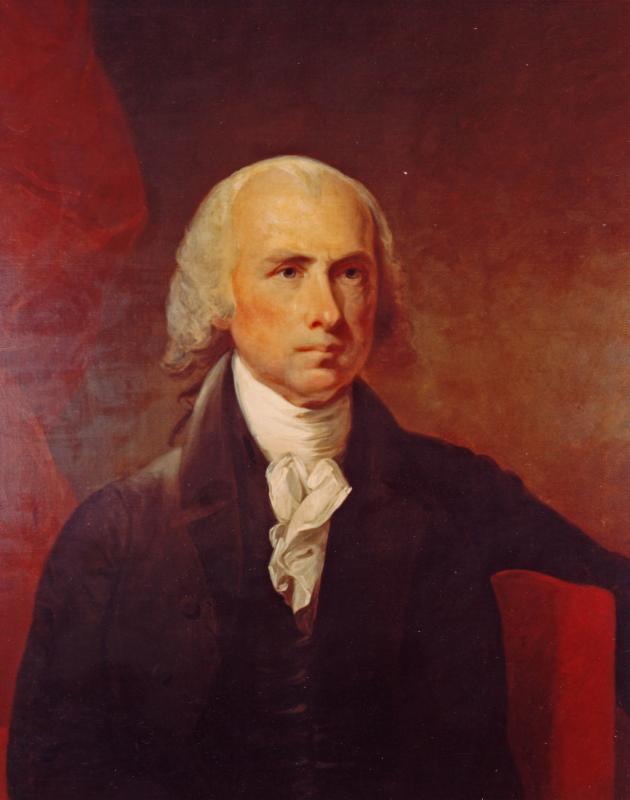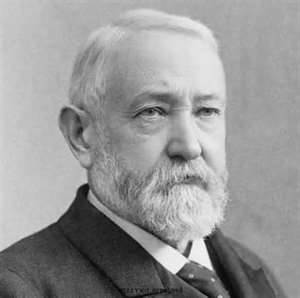, editors Mark & Jo Ann Skousen, Regnery, 2006, pp. 331-333):
“There is a tradition that in the planting of New England, the first settlers met with many difficulties and hardships, as is generally the case when a civiliz’d people attempt to establish themselves in a wilderness country.

…Being so piously dispos’d, they sought relief from heaven by laying their wants and distresses before the Lord in frequent set days of fasting and prayer.
Constant meditation and discourse on these subjects kept their minds gloomy and discontented, and like the children of Israel there were many dispos’d to return to the Egypt which persecution had induc’d them to abandon…”

“At length, when it was proposed in the Assembly to proclaim another fast, a farmer of plain sense rose and remark’d
that the inconveniences they suffer’d, and concerning which they had so often weary’d heaven with their complaints, were not so great as they might have expected, and were diminishing every day as the colony strengthen’d;
that the earth began to reward their labour and furnish liberally for their subsistence;

…that their seas and rivers were full of fish, the air sweet, the climate healthy, and above all, they were in the full enjoyment of liberty, civil and religious.
He therefore thought that reflecting and conversing on these subjects would be more comfortable and lead more to make them contented with their situation; and that it would be more becoming the gratitude they ow’d to the divine being, if instead of a fast they should proclaim a thanksgiving.

…His advice was taken, and from that day to this, they have in every year observ’d circumstances of public felicity sufficient to furnish employment fora Thanksgiving Day, which is therefore constantly ordered and religiously observed.”

“The grateful feeling of their hearts … join the penitent confession of their manifold sins …
and … under the providence of Almighty God … secure for these United States the greatest of all human blessings, independence and peace.”
I do therefore … issue this proclamation … appointing … a day of public and solemn Thanksgiving and Prayer to Almighty God … Given under by hand … this 11th day of November, in the year of our Lord, 1779 … Thomas Jefferson.”
in the rescuing the person of our Commander-in-Chief and the army from imminent dangers, at the moment when treason was ripened for execution …
the United States in Congress assembled … do hereby recommend it to the inhabitants of these states in general, to observe … the last Thursday … of November next, as a Day of Solemn Thanksgiving to God for all his mercies.”
Massachusetts Governor John Hancock, who was a former President of the Continental Congress, proclaimed
a Day of Thanksgiving, November 8, 1783:
“The Citizens of these United States have every Reason for Praise and Gratitude to the God of their salvation ...
I do … appoint … the 11th day of December next (the day recommended by the Congress to all the States) to be religiously observed as a Day of Thanksgiving and Prayer,
that all the people may then assemble to celebrate … that he hath been pleased to continue to us the Light of the Blessed Gospel …
That we also offer up fervent supplications … to cause pure Religion and Virtue to flourish … and to fill the world with His glory.”

After passing the Bill of Rights, which included the First Amendment, Congress requested President George Washington issue a National Day of Thanksgiving, which he did, October 3, 1789:
“Whereas it is the duty of all Nations to acknowledge the providence of Almighty God, to obey his will, to be grateful for his benefits, and humbly to implore his protection and favor–
and Whereas both Houses of Congress have by their joint Committee requested me
‘to recommend to the People of the United States a Day of Public Thanksgiving and Prayer to be observed by acknowledging with grateful hearts the many signal favors of Almighty God, especially by affording them an opportunity peaceably to establish a form of government for their safety and happiness;’
Now, therefore, I do recommend … Thursday, the 26TH DAY of NOVEMBER …

…to be devoted by the People of these United States to the service of that great and glorious Being, who is the beneficent Author of all the good that was, that is, or that will be …
That we may then all unite in rendering unto Him our sincere and humble Thanks … for the peaceable and rational manner in which we have been enabled to establish constitutions of government…
particularly the national one now lately instituted, for the civil and religious liberty with which we are blessed … to promote the knowledge and practice of true religion and virtue.”

A Whiskey Rebellion in western Pennsylvania almost caused the new American Republic to fall into chaos.
When is was peacefully resolved, President George Washington proclaimed a National Day of Thanksgiving, September 25, 1794:
“Resolved, in perfect reliance on that gracious Providence which so signally displays its goodness towards this country to reduce the refractory to a due subordination to the law …

…To call to mind that, as the people of the United States have been permitted, under Divine favor, in perfect freedom, after solemn deliberation, and in an enlightened age, to elect their own government,
so will their gratitude for this inestimable blessing be best distinguished by firm exertions to maintain the Constitution and the laws.”

On January 1, 1795, President George Washington proclaimed a Day of Thanksgiving:
“When we review the calamities, which afflict so many other nations …
the great degree of internal tranquility we have enjoyed –
the recent confirmation of that tranquility by the suppression of an insurrection which so wantonly threatened it – the happy course of public affairs in general –
the unexampled prosperity of all classes of our citizens; are circumstances which peculiarly mark our situation with indications of the Divine beneficence towards us.
In such a state of things it is, in an especial manner, our duty as people, with devout reverence and affectionate gratitude, to acknowledge our many and great obligations to Almighty God and to implore Him to continue and confirm the blessings we experience …

…I, George Washington, President of the United States, do recommend to all religious societies and denominations, and to all persons whomsoever, within the United States,
to set apart … a Day of public Thanksgiving and Prayer: and on that day to meet together and render their sincere and hearty thanks to the great Ruler of Nations.”

After the War of 1812was ended with the Treaty of Ghent, President James Madison proclaimed a Day of Thanksgiving, March 4, 1815:
“The Senate and House of Representatives … signified their desire that a day may … be observed by the people of the United States with religious solemnity as a Day of Thanksgiving and of devout acknowledgments to Almighty God for His great goodness manifested in restoring to them the blessing of peace.
No people ought to feel greater obligations to celebrate the goodness of the Great Disposer of Events and of the Destiny of Nations than the people of the United States.

…His kind Providence originally conducted them to one of the best portions of the dwelling place allotted for the great family of the human race.
He protected … them under all the difficulties and trials to which they were exposed in their early days …
In the arduous struggle … they were distinguished by multiplied tokens of His benign interposition …
He … enabled them to assert their national rights and to enhance their national character in another arduous conflict, which is now so happily terminated by a peace and reconciliation with those who have been our enemies.
And to the same Divine Author of Every Good and Perfect Gift we are indebted for all those privileges and advantages, religious as well as civil, which are so richly enjoyed in this favored land …
I now recommend … a Day on which the people of every religious denomination may in their solemn assemblies unite their hearts and their voices in a freewill offering to their Heavenly Benefactor of their homage of Thanksgiving and of their songs of praise.
Given … in the year of our Lord one thousand eight hundred and fifteen … James Madison.”

Abraham Lincoln proclaimed the first “Annual” National Day of Thanksgiving, Washington, D.C., October 3, 1863:
“In the midst of a civil war of unequalled magnitude and severity …
I do therefore invite my fellow citizens in every part of the United States, and also those who are at sea and those who are sojourning in foreign lands, to set apart and observe the last Thursday of November next, as a day of Thanksgiving and Praise to our beneficent Father who dwelleth in the Heavens.
And I recommend … they do also, with humble penitence for our national perverseness and disobedience, commend to His tender care all those who have become widows, orphans, mourners or sufferers in the lamentable civil strife in which we are unavoidably engaged,
and fervently implore the interposition of the Almighty Hand to heal the wounds of the nation and to restore it as soon as may be consistent with the Divine purposes to the full enjoyment of peace, harmony, tranquillity and Union.

…In testimony whereof, I have hereunto set my hand and caused the Seal of the United States to be affixed.
Done at the City of Washington, this Third day of October, in the year of our Lord one thousand eight hundred and sixty-three, and of the Independence of the United States the Eighty-eighth.
By the President: Abraham Lincoln
William H. Seward, Secretary of State.”

America was spared a global cholera pandemic, as referenced in President Grover Cleveland’s National Day of Thanksgiving and Prayer Proclamation,November 1, 1888:
“On that day let all our people suspend their ordinary work and occupations, and in their accustomed places of worship, with prayer and songs of praise, render thanks to God for all His mercies …
And mindful of the afflictive dispensations with which a portion of our land has been visited, let us, while we humble ourselves before the power of God, acknowledge His mercy in setting bounds to the deadly march of pestilence, and let our hearts be chastened by sympathy with our fellow-countrymen who have suffered and who mourn.
And as we return thanks for all the blessings which we have received from the hand of our Heavenly Father, let us not forget that He has enjoined upon us charity;
and on this day of thanksgiving let us generously remember the poor and needy, so that our tribute of praise and gratitude may be acceptable in the sight of the Lord.”

On the 100th anniversary of Washington’s Inauguration, President Benjamin Harrison issued a National Day of Prayers and Thanksgiving, April 4, 1889:
“George Washington took the oath of office as Chief Magistrate of the new-born Republic. This impressive act was preceded at 9 o’clock in the morning in all the churches of the city by prayer for God’s blessing on the Government and its first President …
In order that the joy of the occasion may be associated with a deep thankfulness in the minds of the people for all our blessings in the past and a devout supplication to God for their gracious continuance in the future, the representatives of the religious creeds, both Christian and Hebrew, have memorialized the Government to designate an hour for prayer and thanksgiving on that day.”

In his National Day of Thanksgiving Proclamation, October 29, 1900, President William McKinley acknowledged the charitable help given to the city of Galveston after a hurricane:
“The works of religion and charity have everywhere been manifest … We have been generally exempt from pestilence and other great calamities; and even the tragic visitation which overwhelmed the city of Galveston made evident the sentiments of sympathy and Christian charity by virtue of which we are one united people.
Now, therefore, I, William McKinley, President of the United States, do hereby appoint and set apart Thursday, the 29th of November next, to be observed by all the people of the United States, at home or abroad, as a day of thanksgiving and praise to Him who holds the nations in the hollow of His hand …
and that they humbly pray for the continuance of His Divine favor, for concord and amity with other nations, and for righteousness and peace in all our ways.”

President Theodore Rooseveltacknowledged how rare America is in his National Day of Praise and Thanksgiving Proclamation, October 24, 1903:
“During the last year the Lord has dealt bountifully with us …
It behooves us not only to rejoice greatly because of what has been given us, but to accept it with a solemn sense of responsibility, realizing that under Heaven it rests with us ourselves to show that we are worthy to use aright what has thus been entrusted to our care.
In no other place and at no other time has the experiment of government of the people, by the people, for the people, been tried on so vast a scale as here in our own country in the opening years of the 20th Century.
Failure would not only be a dreadful thing for us, but a dreadful thing for all mankind, because it would mean loss of hope for all who believe in the power and the righteousness of liberty.
Therefore, in thanking God for the mercies extended to us in the past, we beseech Him that He may not withhold them in the future.”